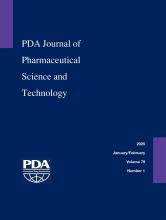Abstract
A simulating leaching (migration) study was performed on a model container-closure system relevant to parenteral and ophthalmic drug products (PODP). This container-closure system consisted of a linear-low density polyethylene bottle (primary container), a polypropylene cap and an elastomeric cap liner (closure), an adhesive label (labeling) and a foil overpouch (secondary container). The bottles were filled with simulating solvents (aqueous salt/acid mixture at pH 2.5, aqueous buffer at pH 9.5, and 1/1(v/v) IPA/water), a label was affixed to the filled and capped bottles, the filled bottles were placed into the foil overpouch and the filled and pouched units were stored either upright or inverted for up to 6 months at 40°C. After storage, the leaching solutions were tested for leached substances using multiple complementary analytical techniques to address volatile, semi-volatile, and non-volatile organic and inorganic extractables as potential leachables. The leaching data generated supported several conclusions, including that (a) the extractables (leachables) profile revealed by a simulating leaching study can qualitatively be correlated with compositional information for materials of construction, (b) the chemical nature of both the extracting medium and the individual extractables (leachables) can markedly affect the resulting profile and (c) while direct contact between a drug product and a system's material of construction may exacerbate the leaching of substances from that material by the drug product, direct contact is not a prerequisite for migration and leaching to occur.
- Received September 2, 2016.
- Accepted September 6, 2016.
- Copyright © 2016, Parenteral Drug Association
PDA members receive access to all articles published in the current year and previous volume year. Institutional subscribers received access to all content. Log in below to receive access to this article if you are either of these.
If you are neither or you are a PDA member trying to access an article outside of your membership license, then you must purchase access to this article (below). If you do not have a username or password for JPST, you will be required to create an account prior to purchasing.
Full issue PDFs are for PDA members only.
Note to pda.org users
The PDA and PDA bookstore websites (www.pda.org and www.pda.org/bookstore) are separate websites from the PDA JPST website. When you first join PDA, your initial UserID and Password are sent to HighWirePress to create your PDA JPST account. Subsequent UserrID and Password changes required at the PDA websites will not pass on to PDA JPST and vice versa. If you forget your PDA JPST UserID and/or Password, you can request help to retrieve UserID and reset Password below.






